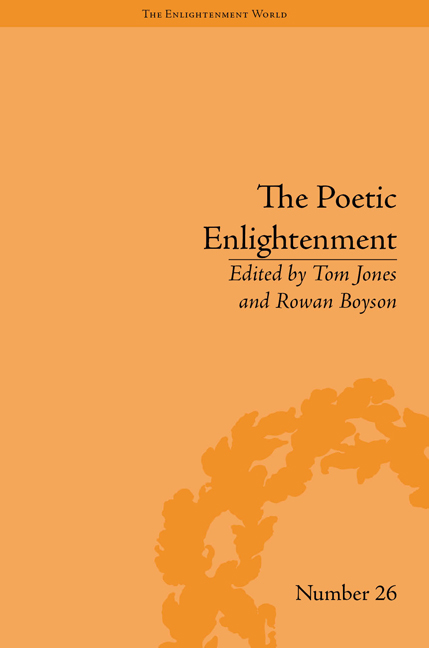Book contents
- Frontmatter
- CONTENTS
- Acknowledgements
- List of Contributors
- General Introduction
- I Poetic Knowledge and the Knowledge of Poetry
- II Poetic Theories of the Social Self
- 5 Introduction
- 6 Hobbes and Davenant: Poetry as Civil Science
- 7 Facing the Misery of Others: Pity, Pleasure and Tragedy in Scottish Enlightenment Moral Philosophy
- 8 Poetical Stoical Shaftesbury
- 9 Morality as a Discourse of the Imagination
- III Enlightenment and Romantic Poetologies
- Notes
- Index
6 - Hobbes and Davenant: Poetry as Civil Science
from II - Poetic Theories of the Social Self
- Frontmatter
- CONTENTS
- Acknowledgements
- List of Contributors
- General Introduction
- I Poetic Knowledge and the Knowledge of Poetry
- II Poetic Theories of the Social Self
- 5 Introduction
- 6 Hobbes and Davenant: Poetry as Civil Science
- 7 Facing the Misery of Others: Pity, Pleasure and Tragedy in Scottish Enlightenment Moral Philosophy
- 8 Poetical Stoical Shaftesbury
- 9 Morality as a Discourse of the Imagination
- III Enlightenment and Romantic Poetologies
- Notes
- Index
Summary
In the spring of 1650, the mathematician Charles Cavendish wrote from Antwerp to his friend John Pell on the current state of the European republic of letters. After touching on Descartes on the passions, and Pierre Gassendi's ‘Epicurean philosophie’, Cavendish turned to the activities of Thomas Hobbes. He was well-placed to comment on this latter topic, since he and his brother, the marquess of Newcastle, had until recently been intimate members of Hobbes's circle in Paris. However, Cavendish confessed that he had not
heard from Mr: Hobbes a longe time but Sr: william Davenant latelie sent my Brother a Preface, to an intended poem of his not yet printed; but the preface printed & directed to Mr: Hobbes with Mr: Hobbs his answear to it, likewise printed & bound together. I have not yet read them; I had rather read his philosophi[e] which I hope he will ere long publish.
Such impatience is understandable. Hobbes was known to be completing a major statement of his thought, De corpore (to which this letter appears to allude), on which he had been working throughout the 1640s. Cavendish's frustration would only have been compounded had he been aware that Hobbes was in fact engaged in the composition of a yet more significant text, the Leviathan, which would be published the following year. Nevertheless, Cavendish's surviving papers reveal that he did go on to study Hobbes's answer to Davenant. And in this he may have discovered a work of philosophical, as well as purely literary, interest.
The dramatist and poet William Davenant was one of the most prominent cultural arbiters of the early Stuart court. His burgeoning reputation in the 1630s brought him the patronage of Queen Henrietta Maria, whom he followed into Parisian exile in 1646 after the collapse of the royalist cause in England. It was here that Davenant met Hobbes, who had been resident in the city for the last five years.
- Type
- Chapter
- Information
- The Poetic EnlightenmentPoetry and Human Science, 1650–1820, pp. 63 - 74Publisher: Pickering & ChattoFirst published in: 2014

